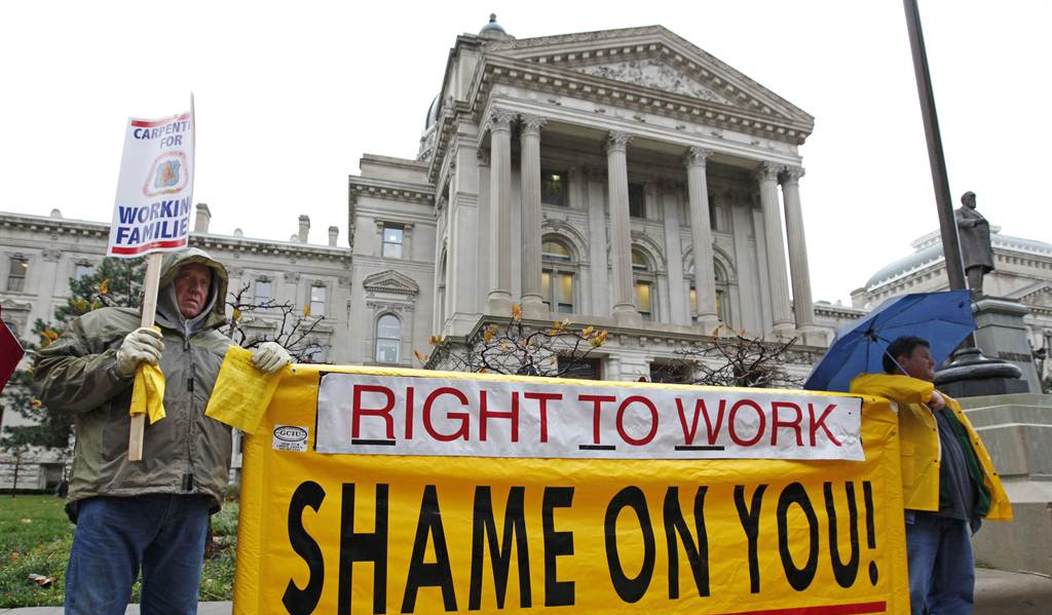In the United States, labor unions are quickly becoming an “economic anachronism.” Despite the downward trend in union membership and influence, in June, Governor Jay Nixon vetoed legislation that would’ve made Missouri the 26th right-to-work state in the country. In doing so, Governor Nixon is going against the will of the people of Missouri and promoting policies that will continue to keep Missouri less competitive than many of its neighbors which have adopted right-to-work laws.
Missouri House Bill 116 overwhelmingly passed in both the Missouri House and Senate this summer despite bitter opposition from unions and union front groups. Later this September, the Missouri Legislature will convene and vote on whether to override Governor Nixon’s veto. The Senate is only two votes shy of the necessary amount for an override, and the House is 17 votes short. With 27 Missouri Republicans originally voting against the right-to-work legislation, it is very possible that with some convincing they could be amenable to voting in support of the veto override.
At their peak in the 1960s, more than 27 percent of Missouri workers were union members. That number has dwindled to just 8 percent today. The rates of unionization in Missouri over time mirror the national rates. In the 1960s, 30 percent of all U.S. workers were unionized. Now that figure is only 11 percent. The decline in union membership-- and as a result, union power-- has facilitated the popularity of right-to-work legislation. It’s surprising Missouri is still not a right-to-work state,considering that states with traditionally higher rates of unionization, like Wisconsin and Michigan, have already passed right-to-work laws.
Blocking right-to-work legislation won’t stop the declining relevance of labor unions.
Most Americans and Missourians support right-to-work laws. A poll by the Missouri Alliance for Freedom, a conservative group, found that 54 percent of Missourians support right-to-work. A different survey conducted by polling group American Viewpoint found that 60 percent of Missourians supported HB 116. Support for right-to-work laws are even higher nationally, with one Gallup poll finding that 71 percent of Americans are in favor, including 65 percent of people who identify as Democrats.
Recommended
The changing relationship between Democrats and unions was evident during the debate over the Trans-Pacific Partnership trade agreement this summer. Democratic Missouri Senator Claire McCaskill drew the ire of labor unions in Missouri for her support to fast-track the bill through Congress. Democratic Missouri Congressman Emanuel Cleaver even acknowledged that “organized labor today is not what it was 25 years ago.”
The fear that right-to-work legislation will bring anything but increased prosperity to Missouri is unfounded.
Right-to-work bills like Missouri’s prevent unions from automatically deducting dues from workers’ paychecks. If the veto is overridden, workers who don’t wish to join a union do not have to contribute to the union and will be able to home a larger paycheck. Heritage Foundation labor policy expert James Sherk, also notes that “private-sector workers in right-to-work states have the same real wages as in states where the government forces them to pay union dues. And workers in right-to-work states also have lower unemployment rates.” Six out of the eight states bordering Missouri have right-to-work laws on the books. Missouri will be at a competitive disadvantage without its own right-to-work laws in place. Neighboring Warren County, Kentucky has right-to-work laws in place, and has seen 4,700 new jobs created since December 2014.
Overriding the Governor’s right-to-work veto wouldn’t be a death blow to the Missouri unions, but a boon to Missourians yearning for faster economic growth. The days of unions bullying politicians into submission seem long gone based on how even Democrats in Missouri have been behaving as of late. This is a welcomed trend, as right-to-work laws bring greater economic prosperity to the states with the political will to pass them.

























Join the conversation as a VIP Member